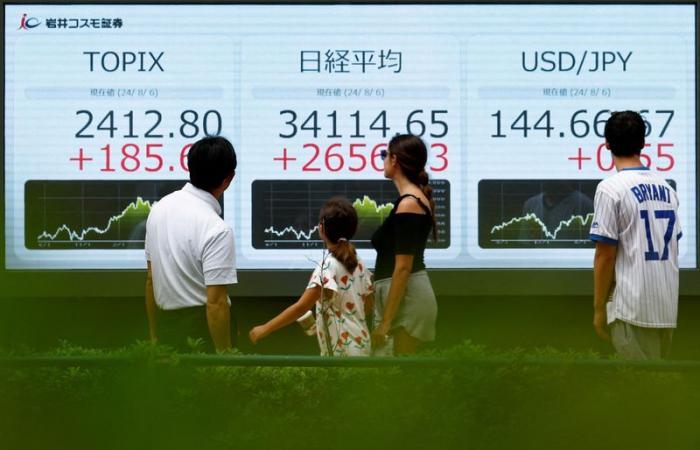
Hong Kong stocks led declines in Asia on Monday after Beijing’s latest stimulus measures fell short of investors’ expectations, eclipsing Friday’s Wall Street records and futures pointing to greater strength at the reopening of markets.
Bitcoin reached an all-time high following Donald Trump’s victory in the US presidential election and the election of pro-cryptocurrency candidates to Congress, raising hopes for a regulatory environment more flexible.
The dollar traded close to last week’s four-month high against major peers, as traders braced for a key inflation reading from U.S. consumers this week, as well as a parade of speakers of the Federal Reserve, including Chairman Jerome Powell on Thursday.
Hong Kong’s Hang Seng fell 2.5% by 0200 GMT, with a subindex of mainland Chinese property stocks tumbling 3.9%. Chinese blue chips weakened by 0.3%.
Japan’s Nikkei fell 0.3%. South Korea’s Kospi lost 0.9% and Taiwan’s benchmark slipped 0.7%.
The benchmark Australian shares index fell 0.4%, weighed down by commodity-related stocks, after oil and industrial metals fell.
On Friday, after Chinese markets closed, the standing committee of the National People’s Congress unveiled a 10 trillion yuan ($1.39 trillion) debt plan to ease financing difficulties for local governments and to stabilize slowing economic growth.
However, the stimulus measures have failed to directly inject money into the economy, as some investors had hoped, especially under the threat of massive tariffs under the incoming Trump administration.
Macquarie analysts wrote in a note: “This is perhaps disappointing for those who expected the NPC meeting to approve a massive tax package, but that expectation is unrealistic as the “The policy objective is to achieve the GDP growth target and reduce tail risks, not to significantly inflate the economy.”
“Furthermore, China’s policies will only respond to its own economic conditions, not the outcome of the US election.
The stimulus disappointment, however, overshadowed what should have been a positive sign from Wall Street, where the S&P 500 topped 6,000 points for the first time before closing at a record just below that level.
S&P 500 futures rose 0.2% on Monday.
The Republican Party is moving closer to winning both houses of Congress, capturing the Senate on election night and obtaining, according to Edison Research projections, 214 seats out of the 218 needed to control the House of Representatives. , compared to 205 for the Democrats.
Investors expect Mr. Trump’s second term to bring stock-friendly tax cuts and easing regulations.
Bitcoin, which was another big “Trump trade,” extended its record run to hit a new all-time high of $81,756.
Mr. Trump has pledged to make the United States “the crypto capital of the planet.”
The dollar index, which measures the currency against six other major currencies, was steady at 105.01 after Friday’s 0.55% rise.
Traders will watch consumer price data on Wednesday to see if it remains stable, which could hurt the chances of an interest rate cut at the next meeting in December.
Markets currently have a 65% chance of seeing a quarter-point reduction on Dec. 18, according to the CME Group’s FedWatch tool.
The dollar rose 0.5% to 153.39 yen, reversing some of Friday’s weakness, when the pair followed long-term U.S. Treasury yields lower.
Minutes of the Bank of Japan’s October meetings showed officials were divided on when they could raise rates, although market reaction was muted.
US bond markets are closed Monday for Veterans Day, but Wall Street will be open.
The euro remained stable at $1.0721, not far from its lowest level in four months. Political uncertainty continued to weigh on the market as German Chancellor Olaf Scholz said he would be prepared to hold a confidence vote before Christmas, paving the way for snap elections following the collapse of his coalition government.
Sterling was little changed at $1.2922.
Gold fell 0.5% to $2,669.69 an ounce, moving further away from last month’s record high of $2,790.15.
Base metals in Shanghai slipped, with the most-traded December copper contract on the Shanghai Futures Exchange (SHFE) down 0.9% to 76,570 yuan per tonne.
Oil prices extended Friday’s declines, when Brent and West Texas Intermediate (WTI) each fell more than 2%. On Monday, Brent crude futures fell 0.3% to $73.68 a barrel, while U.S. WTI futures lost 0.4% to $70.13 a barrel.
($1 = 7.1787 Chinese yuan renminbi)





